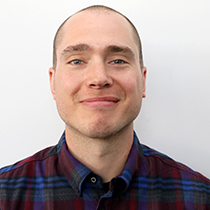Dr Michael Curtis
Postdoctoral Research Officer
Working groups

Background
Michael is a Postdoctoral Research Officer at the Burnet Institute and a Research Associate at the National Drug Research Institute, Curtin University. Michael’s research interests include the use of prospective survey and linked administrative data to improve the health and well-being of marginalised groups, with a particular focus on people in prison and people who inject drugs.
Michael completed a PhD in 2023 under the supervision of Professor Mark Stoové and Professor Paul Dietze with Monash University and Burnet Institute. Michael’s PhD examined the impact of retention in opioid agonist treatment on substance use, health and health service use among men recently released from prison. Between 2014-2022, Michael worked at the Burnet Institute as a Research Assistant, primarily collecting data for substance-use related prospective cohort studies.
Before joining Burnet, Michael worked as a social worker in in adult intensive case management, homelessness, and youth out-of-home care.
Qualifications
- 2023: PhD, Monash University, Australia
- 2012: BA/BSW(Hons), Monash University, Australia
Appointments
- Research Associate, National Drug Research Institute, Curtin University
Positions
- 2023-present: Postdoctoral Research Officer, Burnet Institute
- 2022-present: Research Associate, NDRI, Curtin University
- 2019-2023: PhD Candidate, Monash University and Burnet Institute
- 2014-2023: Research Assistant, Burnet Institute
- 2010-2014: Social Worker, Salvation Army Crisis Services.
Awards
- 2021: INHSU 2021 Conference Scholarship
- 2021: Miller Foundation Public Health Travel Award
- 2021: Burnet Student Symposium Best Three Minute Thesis
- 2019: Monash Addiction Research Centre PhD top-up scholarship
- 2018: National Health and Medical Research Council postgraduate award
- 2012: Peter Boss Honours Prize for Social Work.
Burnet publications
View 28 morePrevalence and correlates of previous adult imprisonment among Australians who primarily smoke methamphetamine: a cross-sectional study
Harm Reduction Journal
Anna L. Peters et al
Age, period and cohort trends in hospital admissions for alcohol‐related liver disease in Australia, 1993–2020
Drug and Alcohol Review
Michael Livingston et al
Changing patterns of opioid agonist therapy prescribing in a network of specialised clinics providing care to people with opioid use disorder in Victoria , Australia , 2015 to 2023
Drug and Alcohol Review
Joshua Dawe et al
Reports and other work
-
ST KILDA 24-HOUR NSP EVALUATION.
The Salvation Army commissioned the Burnet Institute to gather data on its 24-hour needle and syringe program (NSP) in St Kilda. Uniquely in Victoria, the St Kilda NSP is funded to run a staffed service 24 hours a day, seven days a week, and has been in operation with this model for over 10 years. This section is an executive summary of the Burnet Institute’s findings about the role, impact, and effectiveness of the St Kilda 24-hour NSP service.
ST KILDA 24-HOUR NSP EVALUATION. -
The Forest proposal
Explains how we developed The Forest - a model to address underlying causes of incarceration.
The Forest proposal -
The Forest co-design report (Burnet Institute and Paper Giant)
Describes the process and evidence behind The Forest - a model to address underlying causes of incarceration.
The Forest co-design report (Burnet Institute and Paper Giant)
-
Economic and health cost benefit impacts of The Forest (Insight Economics)
Describes the economic and social benefits of The Forest - a model to address underlying causes of incarceration.
Economic and health cost benefit impacts of The Forest (Insight Economics)
Current projects
View 8 moreSubstance use support for women moving in and out of prison (SUSTain)
We’re delivering alcohol and other drugs transitional care for women leaving prison – codesigned with those who know it best.
The HARP trial: improving mental health and wellbeing after release from prison
This project aims to improve the health and wellbeing of people who are incarcerated.
Unlocking health: using linked administrative data to improve health outcomes for people incarcerated in Victoria
In this project we aim to establish a system for monitoring health and health service use among people leaving prison in Victoria.
News and features

Australia Awards Fellows join Burnet to improve outcomes for people with hepatitis C
We welcomed Australia Awards Fellowships delegates from Myanmar and Tanzania in July to learn more about the prevention, treatment and testing of hepatitis C and harm reduction for people who inject drugs.
NHMRC grants for Burnet research
Burnet studies reflecting the breadth of the Institute’s research will benefit from NHMRC grants worth more than AUD$3.3million.



